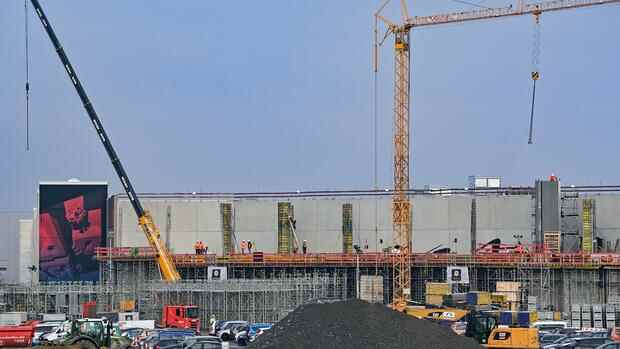Lengthy approval procedures are seen as a brake on large industrial projects.
(Photo: dpa)
Berlin Planning for large construction projects could probably progress much faster if the legislature were to curtail citizens’ right to have a say. This is the result of a report by the Cologne law firm Luther for the Association of the Chemical Industry (VCI).
“A possible starting point for achieving accelerating effects are the procedures for public participation,” write the lawyers. In particular, this applies to the “time-consuming discussion meeting” in the environmental approval process under the Federal Immission Control Act.
The experts consider such an appointment for the oral exchange of objections raised against a project to be dispensable and a waiver also possible under European law. Legally, it is “not necessary to give the public an opportunity for oral exchange in addition to submitting statements in text form. Union law does not require this, ”says the report.
The lawyers also classify the previous procedural practice as “particularly time-consuming” due to the scarce resources on the part of the approval authorities and the project developers. This affects, among other things, the preparation of appointments, which “regularly takes a lot of time”.
Top jobs of the day
Find the best jobs now and
be notified by email.
It includes, for example, the preparation of keynotes for every conceivable oral presentation and, especially in the case of disputed large-scale projects, can go as far as a trial simulation of the appointment and communication training with specialized agencies and law firms, the experts write in their expertise.
Tesla criticism of German bureaucracy
The economy has been demanding faster planning and approval procedures in Germany for a long time. “When it comes to approval procedures for new wind and solar power plants, we move like a koala during its afternoon nap – not at all,” criticized Christian Kullmann, President of the VCI and CEO of Evonik.
The US electric car manufacturer Tesla, which is currently building its first European factory in Grünheide near Berlin, is also critical of the procedural practice in Germany. To date, there is no timetable for the issuance of a final permit for the Brandenburg plant.
The first cars should roll off the assembly line as early as 2021. Environmentalists and local residents have raised hundreds of objections — including over the environmental risks they see and the water use at the auto plant and battery factory Musk is planning there.
>> Read here: Interview with Brandenburg’s Economics Minister: “Elon Musk is a total workaholic – I don’t know when the man sleeps”
Conservationists and local residents see public participation as a way to raise awareness of negative environmental consequences that a construction project may have. “Citizen participation is an indispensable part of the planning process in a democratic constitutional state,” said the federal director of the German Environmental Aid (DUH), Sascha Müller-Kraenner, to the Handelsblatt. In order to speed up procedures that are often lengthy, he suggested equipping authorities with better staff and digital technology. In addition, uniform rules should apply nationwide for nature conservation issues.
However, the lawyers at the Luther law firm point out that in practice the hearing often does not serve the purpose of “procedural discussion” of the specific project.
Ampel wants to digitize planning processes
Instead, “general social and political considerations of environmental protection and the realities of a modern industrial society in a densely populated country as well as global climate protection” are often put forward. As a result, the hearing often fails to meet the “aim formulated in the law of explaining the objections that are relevant to the approvability of the project and raised in good time, and thereby creating peace”.
Shorter planning and approval procedures are a core project of the new federal government. In their coalition agreement, the SPD, FDP and Greens announced that they would prioritize the digitization of planning and approval processes.
The lawyers at the Luther office welcome the plans. EU law and international environmental law even encouraged greater use of information technology in permitting processes. The extensive file folders that could previously be viewed in the offices of the approval authorities may therefore be replaced by documents on the Internet.
In view of the prevalence of broadband Internet connections in over 90 percent of German households, it does not appear unreasonable to only allow the public Internet access to planning and approval documents, according to the legal opinion.
DUH expert Müller-Kraenner considers this insufficient. “Personal discussion meetings, in which citizens of all age groups and social classes can participate, are essential for barrier-free citizen participation and cannot be replaced by purely written or online procedures on an equal footing,” he said.
More: Record speed despite setbacks: How Tesla and Brandenburg outsmarted the bureaucracy
